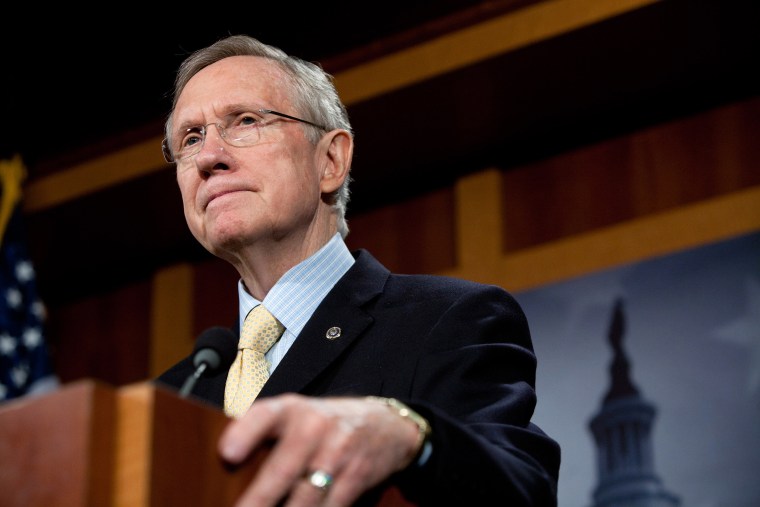My favorite Harry Reid story comes from an incident that unfolded fairly early in his career, not long after he was appointed to chair the Nevada Gaming Commission. In that era, this meant confronting systemic organized crime.
In July 1978, a man named Jack Gordon offered Reid a $12,000 bribe to approve some new gaming devices for casino use. As longtime readers may recall, Reid quickly contacted the FBI, which set up a sting operation. The trap was set: Reid would host a meeting with Gordon, with FBI agents waiting in the next room, watching on cameras recording the exchange for use in trial. Reid was supposed to say, "Is this the money?" at which point, the agents would rush in and arrest Gordon.
But when it came time for the sting, Reid, a former boxer, found it hard to control himself. As the New Yorker reported several years ago, the videotape showed Reid "getting up from his chair and saying, 'You son of a b——, you tried to bribe me!' and attempting to choke Gordon." The FBI agents rushed in to arrest Gordon — and to pry Reid away from the suspect.
I've long believed American politics should have more lawmakers who try to strangle those who offer bribes and fewer lawmakers who accept bribes.
This was the first story that came to mind last night after seeing NBC News' report on the former senator's passing.
Harry Reid, 82, a titan of the U.S. Senate and its former Democratic leader, died Tuesday, having rising from poverty to represent Nevada for decades and help usher in historic legislation, including the Affordable Care Act. His wife, Landra Reid, announced his death in a statement.... Reid was a senator from 1987 to 2017 and majority leader from 2007 to 2015.
For those who haven't followed politics closely, it may not be immediately obvious what a political genius Reid was.
In the wake of the 2004 election cycle, after South Dakota's Tom Daschle lost, Senate Democrats needed a new leader. Reid was not an obvious choice.
The senator represented a relatively red state — George W. Bush won Nevada twice — which meant he'd have to be cautious about pushing a progressive agenda. Complicating matters, Reid had earned a reputation as an opponent of gun control, and unlike practically every other Senate Democrat, he wasn't pro-choice.
His personal characteristics didn't exactly help seal the deal. Reid was soft spoken and unassuming. He did not have a commanding presence; he was not an especially good orator; and he made no effort to be charming during his interactions with the media.
But Reid was a genius when it came to politics and personal relationships. The senator — a consummate work horse, not a show horse — understood as well as anyone I've ever seen the value of having an inside game on Capitol Hill.
It's why he won the race for Senate Democratic leader after Daschle's defeat in 2004. It's why he was able to persuade Vermont's Jim Jeffords to leave the Republican Party in 2001, handing Democrats a Senate majority. It's why he was able to convince Pennsylvania's Arlen Specter to also leave the GOP eight years later.
It's why so many of the major legislative accomplishments of Barack Obama's presidency — the Affordable Care Act, the Recovery Act, Wall Street reform, student loan reform, repeal of the "Don't Ask, Don't Tell" policy, ratification of the New START treaty — were able to pass.
It's a legacy worth remembering and celebrating.

